#anais nin collection
Explore tagged Tumblr posts
Text
"I am only responsible for my own heart, you offered yours up for the smashing my darling. only a fool would give out such a vital organ" / "i made no resolutions for the new year. the habit of making plans, of criticizing, sanctioning and molding my life, is too much of a daily event for me" / "everything with me is either worship and passion or pity and understanding. i hate rarely, though when i hate, i hate murderously" / "i write emotional algebra" / "the day came when the risk to remain tight in a bud was more painful than the risk it took to blossom" / "she lacks confidence, she craves admiration insatiably. she lives on the reflections of herself in the eyes of others; she does not dare to be herself" / "i want to bite into life, and to be torn by it" / "i have such a fear of finding another like myself, and such a desire to find one! i am so utterly lonely, but i also have such a fear that my isolation be broken through, and i no longer be the head and ruler of my universe" / "had i not created my whole world, i would certainly have died in other people's" / "i must be a mermaid, rango. i have no fear of depths and a great fear of shallow living" / "the secret of joy is the mastery of pain" / "you carry away with you a reflection of me, a part of me. i dreamed you; i wished for your existence. you will always be a part of my life, if i love you" / "we are like sculptors, constantly carving out of others the image we long for, need, love or desire, often against reality, against their benefit, and always, in the end, a disappointment, because it does not fit them" / "what i cannot love, i overlook" / "do you know what i would answer to someone who asked me for a description of myself, in a hurry? this: ??!! " / "when others asked the truth of me, i am convinced it is not the truth they want, but an illusion they could bear to live with" / "i am lonely, yet not everybody will do. i don’t know why, some people fill the gaps and others emphasize my loneliness" / "to hell, to hell with balance! i break glasses; i want to burn, even if i break myself." / "i'm sick of my own romanticism!" / "i'm restless. things are calling me away. my hair is being pulled by the stars again" / "i feel a little like the moon who took possession of you for a moment and then returned your soul to you. you should not love me. one ought not to love the moon. if you come too near me, i will hurt you"
"what you burnt, broke, and tore is still in my hands; i am the keeper of fragile things, and i have kept of you what is indissoluble"
#anais nin collection#“you live like this / sheltered / in a delicate world / and you believe you are living.”
1 note
·
View note
Text
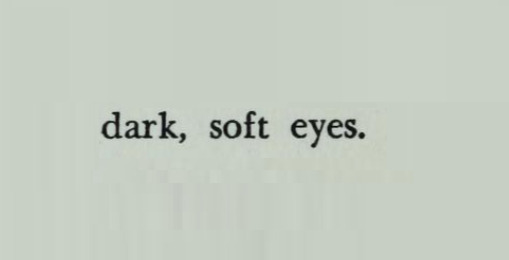
Anaïs Nin, from a diary entry written c. October 1936, featured in The Diary of Anaïs Nin Vol. 2
#lit#anais nin#diary#writings#quote#diary collection#fragments#selections#the diary of anais nin vol. 2#p
6K notes
·
View notes
Text

Emily Dickinson, from The Collected Poems of Emily Dickinson
#the collected poems of emily dickinson#emily dickinson#lit#literature#typo#typography#fragments#light academia#dark academia#aesthetic#240323#oops typo!#trying to just finish this collection finally so i can move on to anais nin's and henry miller's love letters#but man im really feeling these two lines lately#had to share them
34 notes
·
View notes
Text
Trying to find one of those salacious, period-typical sex position guides from the 1920s because I don't know what the straight sexual imaginary was doing beyond the basic missionary/doggy/cowgirl trinity. I have, naturally, a sex manual for young adult women from interwar Poland, but it's more a Facts of Life guide than a latter-day kama sutra, ya dig. Want to write a couple of scenes for this fic but realized I have no idea how straight people fuck, let alone how they fucked in a much more conservative and convention-bound past, but a past that was in some ways more "liberated" by virtue (or vice) of its relative innocence, that is to say, ignorance. Some things were so new they were just novel, they hadn't been socially codified as Good or Bad yet, or they simply weren't mentioned in polite society, so there was no basis for comparison. Idk why Downton Abbey made my brain fixate on "how people fucked in the past" but I'm interested, as I said, like, epistemically and phenomenologically, if that makes sense
#I should read Anais Nin or something#I have a sex manual from interwar Poland because I collect materials from Sanacja-era gov't educational reform#And its program re: creating new people#There's a lot of calisthenics & sex ed & paramilitary training
18 notes
·
View notes
Note
Hi, i'm sorry this is so out of the blue but would you mind sharing sadomasochistic literature recs pls? I love your other rec lists<33
yo not out of the blue at all. i realise i post a lot of content related to sm.
for fiction: besides the obvious bataille, you should look into colette peignot's collected writings under the name laure.
for some rewritten material on her there's kathy acker's my mother demonology. but everything by kathy acker relates to the subject: blood and guts in highschool, empire of the senseless.
(sidenote from an interview w kris kraus on her biography: According to Eleanor Antin, Kathy worked at a massage parlor in Solana Beach for a while, and she did not give massages. [...] She was also, at the same time, tutoring Latin. / If she didn’t give massages, what did she do? / Well, hand jobs, probably.)
another classic but story of o written by pauline réage plus its beautiful illustrations by leonor fini. it's actually said her fantastical owl masks inspired the character of o + she was really close to andré pieyre de mandiargues, whose one story la marge was adapted by walerian borowczky in immoral tales. then there's sacher masoch's venus in furs. you've probably already heard of anais nin's delta of venus.
i specifically highly rec mary gaitskill. bad behaviour is a great short story collection - one of the stories specifically inspired the film secretary (2002). her essay, the trouble with following the rules, on rape culture and agency published in harper's bazaar (later repub in somebody with a little hammer) is one rare occurrence of nuance and grace accorded to women who've had sexual experiences that are difficult to categorise. it gives a rundown of the ways she personally relates to feminist scholars on the subject too.
there's problems by jade sharma. for a more modern story of the eye, try ryu murakami's ecstasy.
for non-fiction (disclaimer that i mostly haven't read these but they are on my list):
gilles deleuze, masochism: coldness and cruelty ; avgi saketopoulou, sexuality beyond consent ; virginie despentes, king kong theory
if you're similarly interested in boundary-pushing experiences, the limits of the body, attraction to the horrific (i getchu) this is moreso sociology, aesthetics, psychoanalysis focused:
elaine scarry, the body in pain ; anne dufourmantelle, in praise of risk ; sylvère lotringer, overexposed: perverting perversions ; umberto eco, on ugliness
other media: the podcast drunk church, the director catherine breillat.
hope this is of help & if you read anything tell me how it went. i'm always looking for more stuff on the subject too.
282 notes
·
View notes
Note
hi, its the webweaving request anon! i saw ur reblog and thats what i was hoping for, sorry I didn't convey that the best way. if you'd like, i'd love to see a collection around the subject or theme of like lovers entwined and/or love persisting after death. i hope its fun, thank you for hearing me out!! :)
of course!! i hope you like it <33
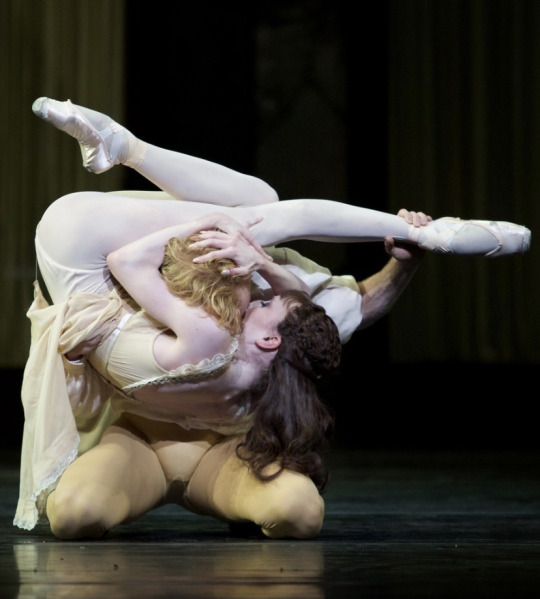

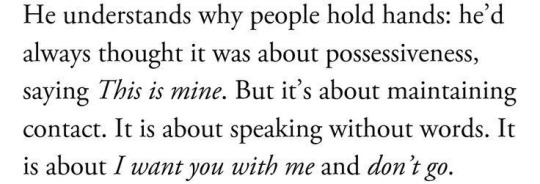

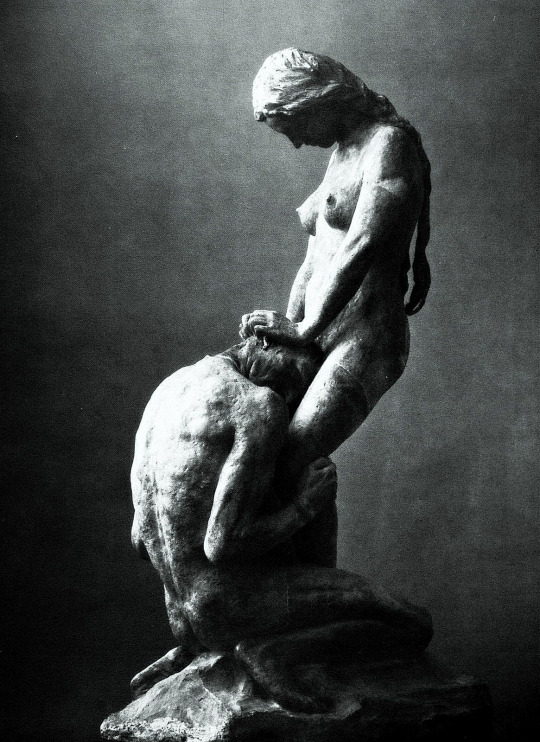

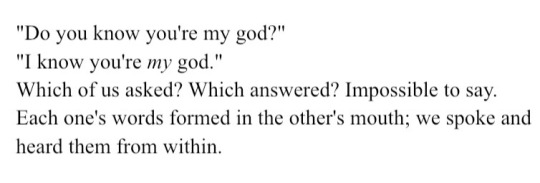






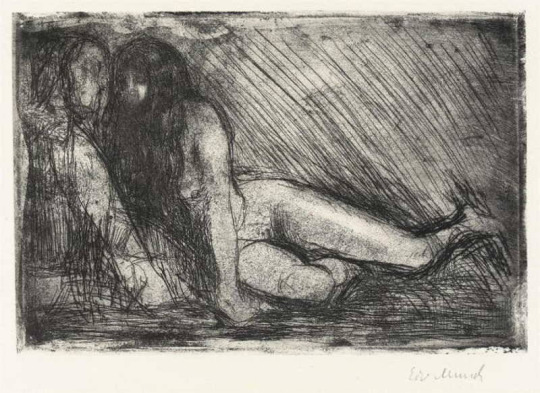



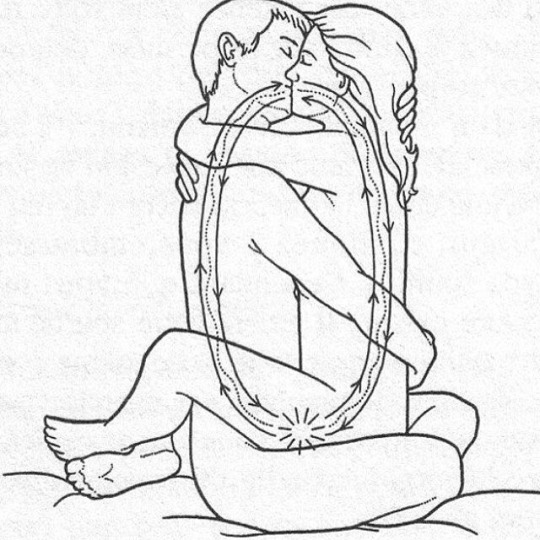
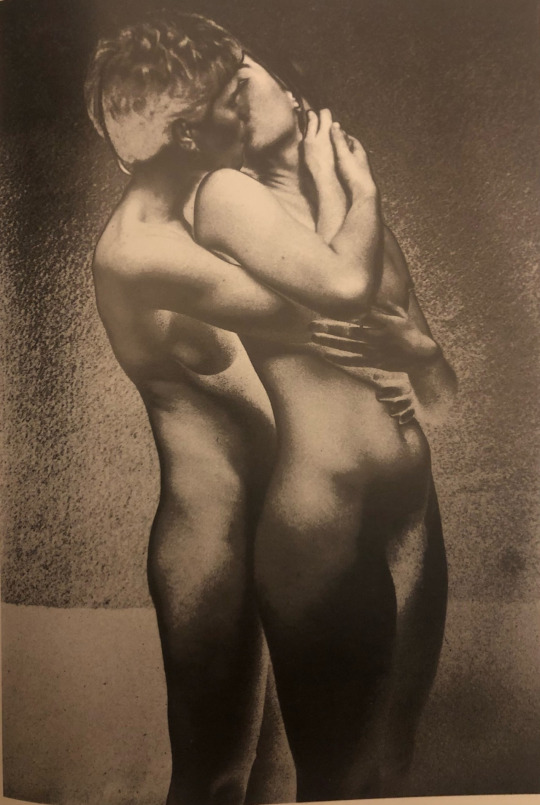






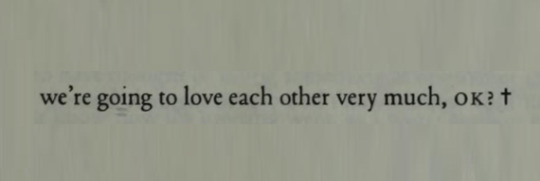
you and i have begun to blur: a collection ballet: maylering starring sarah lamb & steven mcray / unknown / unknown / han kang / eros & psyche by gustav vigeland / unknown / the carnivorous lamb, agustin gomez-arcos / text post / the life of the party, 'the lover as a cult', olivia gatwood / der traum (the dream) by fritz schwimbeck / rebecca, daphne du maurier / text post / unknown / secret by edvard munch / what is otherwise infinite: poems, 'mary magdalene', bianca stone / text post / the diary of anais nin, anais nin / unknown / intimacies by tee a. corinne / text post / unknown / unknown / two figures on a bed by pepijn simon / text post / pan's flute / the letters of frida kahlo: cartas apasionadas
#intimacy#soulmates#web weave#web weaving#web weavings#web weaves#comparative#comparatives#mine#mww#ask#anonymous#i hope you like it anon!! <333#robyn#me and robyn
76 notes
·
View notes
Text








a collection of things that hit slightly too close to home: Ruth Madievsky, All-Night Pharmacy / xoxoabbyxoxox / Suzanne Rivecca, Ugly, Bitter, and True / twoheadedfawnn / Carol Rifka Brunt, Tell the Wolves I'm Home / Anais Nin, The Diary of Anaïs Nin, Vol. 6: 1955-1966 / Franz Kafka, Letters to Felice / unknown
#🌿 misc#web weaving#sorry to be a downer on main#currently experiencing I Don’t Know How To Be A Person Feels#🌿 quotes#web weave
20 notes
·
View notes
Text

Anaïs Nin, from a diary entry written c. January 1936, featured in The Diary of Anaïs Nin Vol. 2
#lit#anais nin#diary#quotes#words#writings#diary collection#fragments#excerpts#selections#the diary of anais nin vol. 2#p
2K notes
·
View notes
Note
If they followed the books they'd be more frisky 🤡
But obviously some of it can't be translated into tv......
Dear Frisky Anon,
You should have discussed it with a real Gabaldon Expert like @gotham-ruaidh, not with Phoney here, who still fumbles around The Fiery Cross. So, I think you will have to ask me once I am done with Bees, which I bet will be just in time for the second half of Season 7 to kick in. I am told J&C do not have any problems in that department until the very end of it, and well, what can I say, it's Herself's prerogative to portray as she sees fit a legendary, all-encompassing love story as the one she magically created out of thin air (all writing is magic, trust me).
Never mind. Your question made me think, just as I was preparing the lazy dinner for 1 (Baby the Retriever is gone until Tuesday evening), about a couple of things, dealing with adapting content to the screen and also about how our minds deal with the difference between a book and the movie/series based on that book.
Adapting Gabaldon is a very difficult task. Take for example The Fiery Cross' never-ending Gathering. My God, all those words to describe just 24 hours! I have just finished with that unfortunate thief and I am so dizzy with it, I can't even remember if they had breakfast yet. The only solution they had was to go off canon and invent something at The Ridge, because it would have taken forever and hey, it's all about a healthy costs/benefits ratio, too. And mark me: Herself is no Marcel Proust, able to make us dream for hours about his description of Vermeer's View of Delft, somewhere In Search of Lost Time. FYI, I had to wait, as millions before me, until I fucked my meniscus skiing (or attempting to snow plough, to be honest) to discover Proust, but never looked back. Also FYI, Luchino Visconti tried to make a film out of Proust's voluminous saga, but failed. Nina Companeez managed (2011) a very, very poor TV series: unwatchable, and I tried. It is unfeasible - so, overall, I think the series scriptwriters' team did a very good job slaloming between botanical babble, Appalachian folklore, the White Sow and yes, J&C getting frisky.
But the thing I wanted to tell you (so long for distributive attention, I've just burnt my baguette and chicken and will have to start it over again) is just how different the experience of reading something and watching the same thing being translated on screen is. I am obviously no neuroscientist, but I am an avid and normally a quick reader. When you read something, you are at once completely spellbound and totally free: you are taken with the characters' interaction, but you are the master of your course imagining them. You placate your own vision of the world on what you read and, at the same time, you are being overtly manipulated by the storyteller: how this can be is, for sure, a mystery. When you watch an adaptation of what you once read, half of the work is being already done for you: you don't have to imagine these people interacting, they are walking and talking in front of you and then, you focus on other things. It's all about the energy they manage (or not) to convey: acting is, in a fair measure, akin to channeling that energy.
As far as I can tell, the scriptwriters opted for a more subdued approach to Jamie, Claire, sex and old age. But can you say with absolute certainty we aren't collectively projecting our own fantasies on what is certainly Herself's very euphemistic, almost conservative way of writing sex scenes? Anais Nin, she ain't. Embraces and moments of - ahem - togetherness abound and we are left to our own devices to imagine things.
Thus, the horrendous and, to be honest, childish battle between the Book Purists' Crowd and the rest of this fandom. It apparently was dealt with pretty quickly, but it did manage to leave a nasty, long lasting legacy: the Book Boyfriend had to go on and remain a screen fantasy. That is wrong. That selfishness almost floundered the book adaptation project and I bet whatever you want me to bet it took deep feelings not to also compromise something else, money can't buy.
A long answer for a simple question. Make of it whatever you wish, Anon: I wrote it with pleasure, though. :)
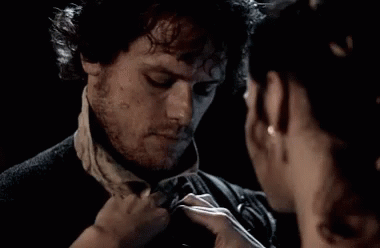
66 notes
·
View notes
Text


HEART SRISEVOK, THE OWNER OF NEXOS NIGHTCLUB
OOC INFORMATION
your alias, timezone, & pronouns: rainie, est, she/her muse’s name: heart srisevok tagging system link: tbd. [ baifern pimchanok, cis-woman, she/her ] Look who just landed! CHALIDA “HEART” SRISEVOK, I sure hope you packed all you need. Perhaps you’re not worried as THE OWNER of NEXOS NIGHTCLUB. The city has plenty of spots for a 33 year old HUMAN like you. You’ll be known in the city soon enough as THE HEDONIST, being CHARISMATIC and NARCISSISTIC. ( rainie, 23, EST, removed for discretion )
STATISTICS
full name: chalida zhong, heart srisevok nickname: while "heart" was originally a nickname she legally changed her named to heart upon arrival to mars. date of birth: may 27th, 2372 gender: cis female pronouns: she/her sexual orientation: lesbian romantic orientation: lesbian current age: thirty-three modification: human affiliation: nexos nightclub birthplace: new york city, new york, earth current neighbourhood: sora occupation: owner of nexos nightclub, information broker known languages: english, thai, mandarin
TRADITIONAL BIOGRAPHY
WHEN CHALIDA ZHONG FLEES EARTH in the dead of night she has three things in her bag. 1. twenty-thousand dollars in liquidated bills, a handle of kentucky bourbon - aged twenty years, and a pair of bedazzled dior sunglasses. when she lands on mars chalida zhong is dead and heart srisevok is born. raised on the upper east side of manhattan heart's childhood was a heady mix of swedish boarding schools, lunches at le bernandin, and sneaking out of the marble penthouses her father kept at different points in the city. her mother, much like her daughter was a bored socialite who had even less interest in having a daughter than she did in being married. her father was old money - fortune 500 conglomerates and caviar for breakfast. and in the middle of it all a young chalida desperate for some sort of attention. but her father's attention is domineering at the best of times and cruel at the worst. still she acts out, lashes out at anything she can - ruins business dinners and ends up on the cover of the social papers in handcuffs. when she was eighteen he demanded this behavior come to an end. she was getting married whether she wanted to or not. from that point on it became near impossible to leave the house. heart knew that just leaving new york wouldn't be far enough. so she liquidated her trust fund shoved what she could in boxes and bags and bought herself a first class ticket to mars. after she landed she shook off her old name. taking on her mother's maiden name and the nickname she'd had growing up. she quickly blew through her trust fund partying and in need of quick cash began escorting. due to heart's life in new york high society she blended seamlessly into the upper echelons of sora. her rates skyrocketed and more than money she began collecting information. by twenty-four heart had blackmailed her way into the upper ranks of sora. she'd amassed enough money to quite escorting entirely and opened nexos. it wasn't enough to run the most successful nightclub in new jakarta though. rumors ran through the place like water so heart gave her staff an objective. hear something? come tell her and reap a healthy bonus on top of an already generous salary. heart developed a reputation for knowing things. after all who wouldn't trust a beautiful woman in a pair of designer heels? what could she possibly do to betray some man who thought himself far more intelligent and savvy than her. for the right price she'd tell you the rumor she heard. of course if you wanted to thank her by sending her some sort of gift she'd never be upset by that.
INSPIRATIONS
pinterest: right here quote: "i will always be the virgin prostitute, the perverse angel, the two faced sinister and saintly woman." -anais nin. label: the hedonist tropes: ethical slut, loveable alpha bitch, hard-drinking party girl media parallels: samantha jones ( sex & the city ), faye valentine ( cowboy bepop ), brooke davis ( one tree hill ), ramona vega ( hustlers ) theme song: crazy girls by toopoor
PERSONALITY
positive traits: charismatic, intelligent, effervescent, loyal neutral traits: cynical, unconstrained, honest, outspoken negative traits: selfish, vindictive, narcissistic, jealous peeves: boring people, business meetings, slow walkers fears: spiders, being forgotten, her father skills: manipulation, drinking a whole bottle of top shelf tequila without dying, bitching goals: to become so rich and powerful she's untouchable
APPEARANCE
faceclaim: baifern pimchanok height: 5'5 eye colour: brown hair colour: brown clothing style: heart prefers skirts and dresses over pants. her clothes tend to be especially tight, revealing, and daring. she's typically the most overdressed person in the room and doesn't wear many shoes aside from heels and the occasional pair of boots. she's an admitted shopaholic with an enviable closet of designer clothes. jewelry: much like her clothing heart has an extensive collection of jewelry she cycles through based on her outfits. she's not particularly attached to any of the pieces tattoos: a small sun on her left hip fragrance: some variant of expensive designer perfume
7 notes
·
View notes
Text
I’m never going to shame anyone for not liking ‘smut’. It’s an acquired taste and truly makes some people uncomfortable.
That’s okay 👍
That being said, while sex isn’t necessary in nearly anything other than a collection of Anais Nin short stories, I find well written erotica to be an interesting scope of a character’s psyche, attraction, sexuality, etc.
Spiciness is so much more than ‘there was only one bed’ and is endlessly fascinating to me 🤔
9 notes
·
View notes
Text
Thinking about the latest smoke on the horizon concerning what adults like to read and how often that seems to be books for children. I don't really understand it, or perhaps I do.
I went to what I cannot overstate was a weird primary school. The main building was an old renovated farmhouse. The walls of one of the big rooms were lined with books of all kinds, mostly not written for children. I remember grabbing a Dostoevsky novel off the shelf in 5th grade (The Idiot) because I was curious. Did I understand it? I was 10 years old, you tell me. Our English teacher had the 9-11 year-olds reading The Call of The Wild and The Crucible. The 12-year-olds were reading Restoration comedy and The Taming of the Shrew at one point. I was not unusually literate as far as I thought. So, keep that in perspective.
I was also reading at home, mainly my parents' large science fiction collection. I usually chose by whichever title or book cover art looked the most intriguing. My favorites were by Ray Bradbury, and they were fairly accessible to children. Even then there were things I didn't "get", but they were interesting anyway. I was also reading a ton of reference books trying to vacuum up as much knowledge as I could. Regardless of schooling, I just cannot remember not wanting to know everything. I also read trash, needless to say.
I got into what was then YA fiction specifically in 6th and 7th grade, because I wanted to know what was considered teen-specific material. Lots of what was available at the public library was pretty weird or actually dark.
Lighter topics included being new in a school and learning the ways of one's peers, but also things like sneaking out of the house at night and going into the city and meeting weird adults in diners and seeing midnight movies. Darker topics included suicidality and abuse, or being forbidden to see a close friend because of homophobia. Happy endings were rare in those books; valuable lessons were hard-discovered and rarely made things better. My point is that every idea was on the table. I was not protected, and that was completely OK by me, even if I was uncomfortable. I wasn't protected in real life, either. By 9th grade I was done with that stuff and reading Anais Nin, Dylan Thomas, and hard sci-fi.
In my 20s I knew a guy my age who was really into Harry Potter and lent me the first book. He was a smart guy with a history degree, and his other favorites were all about World War II or whatever, so yeah, kid's book for fun, sure. It was... fine? But I was 25 and the adventures of Becky Sharp in Vanity Fair were lots more fun.
Does it have something to do with childhood and what that meant to me? By the time I was 8 I was both quasi-nostalgic for an innocence that never was, and longing to be an adult and done with the entire powerless mess of childhood.
It's not that I was any smarter than any other kid - I was simply curious and loved to read and learn things.
3 notes
·
View notes
Text
Thinking about how being the person you want to be requires — at least for me — conscious, deliberate practice, and sitting with discomfort, and dialoguing with that discomfort, and sometimes actively pursuing the discomfort —
And how I don't seem to have the kind of internal measurement apparatus that tells me when the discomfort is constructive and generative vs when it's destructive and unsustainable —
And how these two things, taken together, are implicated in so many of the times of Big Suffering Feelings for me.
There's an answer to this that probably rests in what I've been seeking anyway: healthy, intrinsic self-esteem, and the belief that I'm as deserving as anyone else just because I exist as I am. But then again, one of the things that I know I value is the ability to self-determine (to the extent we can). Like, my luxury gay space communism utopia is one in which we (collectively) have organized so that we (individually) are supported in the fulfilment of ourselves and what we can give to the world.
I want to feel okay with who I am and like it's okay to want to be someone a little different. I suspect this is actually very possible for 'normal people,' whatever those are, but the thing about executive dysfunction is that motivation machine broke.
It's so rare for me to want something in a way that feels like going towards, instead of moving away from. I want to succeed at this in order to appease that; I want to submerge myself in something to avoid the pain of something else. When I want something for itself, for the joy and delight it brings to me, it's frightening both in terms of that vulnerability and in terms of what achieving it would mean. How disruptive it would be.
I'm in a bad spot this weekend, because Operation Gradually Increase Activity appears to have backfired and I'm mostly immobilized with a knee issue. It's a beautiful Saturday in late summer and I'd quite frankly I'd like to be eradicated, immolated, utterly removed and replanted, because I've spent most of 2023 feeling ashamed of how I tried to take (force?) an Anais-Nin-risk-of-blossom when the soil conditions weren't right and it seems like that ruined what needed to be tended.
I've felt amused, delighted, tender, touched, flattered, loving this year, but the last time I remember feeling happy was, I don't know, two months ago? Maybe more? It lasted for about half an hour, and I fell asleep.
In a notebook, I have a two-page spread laid out with different dimensions of my life, and what I'd like them to look like, and when, and the degree to which each of them is substantially different from what my life currently looks like is something I haven't shared with anyone. None of them are about having, all of them are about living and doing but really, it's about creating the conditions in which I know I tend to feel happy.
I know that all of this means I should be getting back on the gratitude practice wagon, that I should be taking more hot girl walks (when I can, uh, walk again), that I need to resume the doing of happiness. The awful thing about adulthood, at least for me, at least since age 35, has been that there is never enough resilience* rebuilt before the next thing falls apart. The next grief, the next disaster, the next loss, the next impossible task. I assume we all live this way, and I just happen to be bad at navigating it.
Thank god there are still words, though. The word machine is not broke, it is a vintage model and the motor turns over every single time I turn it back on, eventually. Thank god we can sing about our calamities; it doesn't erase them, but at least it makes music.
#personal#ramblings#sad sackery!#the thing is i *know* that having an injured knee should not cause me to spiral like this and that is actually the problem here:#the sad whirlpool is always too close at hand#also obviously there are much bigger problems in the world#i promise my day job is one that does not allow me to forget that#*resilience in the healthy self and community way not the corporate wellness way
15 notes
·
View notes
Text
Welcome to my blog 🪽🪽🪽
About my blog ❀❁
I aim for my blog to simply be a large collection of my interests, the advice I give is all authentic and focuses on principles I regularly live by or do, v much no BS advice. There is no direct aim, but I’ll largely focus on these topics:
- femininity
- spiritualism
- fashion
- general advice
- seduction
-beauty
As I continue my blog, if there are topics or suggestions people want advice on, feel free to message me 🪽
About me ❀❁
- You can call me Dawn
- I’m an 18 year old girl
- I am very interested in femininity and beauty
- I am a very spiritual person and believe in a higher being
-My favourite author is Anais Nin
- I generally have a diverse music taste, but some of my favourite artists are Sade, Prince, Stevie Wonder, Lana Del Rey, Rihanna, Amy Winehouse, Jhene Aiko and The Velvet Underground
(*˘︶˘*).。.:*♡ Hope you all enjoy my blog ʚ♡⃛ɞ
Xo Dawn
#light feminine#dark feminine#spirituality#intuition#feminine energy#divine feminine#beauty advice#fashion advice#target audience
2 notes
·
View notes
Photo

Ian Hugo (1898–1985), Tree Woman (from: This Hunger), 1945, colour woodcut.Hugo was married to the writer Anais Nin. They collaborated on a number of literary projects together, one of which was a collection of 5 of Nin’s works titled “This Hunger.”
24 notes
·
View notes
Text
Squash's Book Roundup 2023
Last year I read 67 books. This year my goal was 70, but I very quickly passed that, so in total I read 92 books this year. Honestly I have no idea how I did it, it just sort of happened. My other goal was to read an equal amount of fiction and nonfiction this year (usually fiction dominates), and I was successful in that as well. Another goal which I didn’t have at the outset but which kind of organically happened after the first month or so of reading was that I wanted to read mostly strange/experimental/transgressive/unusual fiction. My nonfiction choices were just whatever looked interesting or cool, but I also organically developed a goal of reading a wider spread of subjects/genres of nonfiction. A lot of the books I read this year were books I’d never heard of, but stumbled across at work. Also, finally more than 1/3 of what I read was published in the 21st century.
I’ll do superlatives and commentary at the end, so here is what I read in 2023:
-The Commitments by Roddy Doyle -A Simple Story: The Last Malambo by Leila Guerriero -The Hero With A Thousand Faces by Joseph Campbell -Uzumaki by Junji Ito -Chroma by Derek Jarman -The Emerald Mile: The epic story of the fastest ride in history through the Grand Canyon by Kevin Fedarko -Venus by Suzan-Lori Parks -The Hearing Trumpet by Leonora Carrington -Sacred Sex: Erotic writings from the religions of the world by Robert Bates -The Virginia State Colony For Epileptics And The Feebleminded by Molly McCully Brown -A Spy In The House Of Love by Anais Nin -The Sober Truth: Debunking the bad science behind 12-step programs and the rehab industry by Lance Dodes -The Sailor Who Fell From Grace With The Sea by Yukio Mishima -The Aliens by Annie Baker -The Criminal Child And Other Essays by Jean Genet -Aimee and Jaguar: A Love Story, Berlin 1943 by Erica Fischer -The Master And Margarita by Mikhail Bulgakov -The Mustache by Emmanuel Carriere -Maldoror by Comte de Lautreamont -Narrow Rooms by James Purdy -At Your Own Risk by Derek Jarman -Escape From Freedom by Erich Fromm -Countdown: A Subterranean Magazine #3 by Underground Press Syndicate Collective -Fabulosa! The story of Britain's secret gay language by Paul Baker -The Golden Spruce: A true story of myth, madness and greed by John Vaillant -Querelle de Roberval by Kevin Lambert -Fire The Bastards! by Jack Green -Closer by Dennis Cooper -The Woman In The Dunes by Kobo Abe -Opium: A Diary Of His Cure by Jean Cocteau -Worker-Student Action Committees France May '68 by Fredy Perlman and R. Gregoire -Capitalist Realism by Mark Fisher -The Sound Of Waves by Yukio Mishima -One Day In My Life by Bobby Sands -Corydon by Andre Gide -Noopiming by Leanne Betasamosake Simpson -Man Alive: A true story of violence, forgiveness and becoming a man by Thomas Page McBee -The Artist's Reality: Philosophies of Art by Mark Rothko -Damage by Josephine Hart -Schoolgirl by Osamu Dazai -The Passion According to G.H. by Clarice Lispector -The Sex Revolts: Gender, Rebellion and Rock n Roll by Simon Reynolds and Joy Press -The Traffic Power Structure by planka.nu -Bird Man: The many faces of Robert Straud by Jolene Babyak -Seven Dada Manifestos by Tristan Tzara
-The Journalist by Harry Mathews -Bullshit Jobs by David Graeber -Moscow To The End Of The Line by Venedikt Erofeev -Morvern Callar by Alan Warner -The Poetics Of Space by Gaston Bachelard -A Boy's Own Story by Edmund White -The Coming Insurrection by The Invisible Committee -Jesus' Son by Denis Johnson -Notes From The Sick Room by Steve Finbow -Artaud The Momo by Antonin Artaud -Doctor Rat by William Kotzwinkle -Recollections Of A Part-Time Lady by Minette -trans girl suicide museum by Hannah Baer -The 99% Invisible City by Roman Mars -Sweet Days Of Discipline by Fleur Jaeggy -Breath: The new science of a lost art by James Nestor -What We See When We Read by Peter Mendelsund -The Cardiff Tapes (1972) by Garth Evans -The Ark Sakura by Kobo Abe -Mad Like Artaud by Sylvere Lotringer -The Story Of The Eye by Georges Bataille -Little Blue Encyclopedia (For Vivian) by Hazel Jane Plante -Blood And Guts In High School by Kathy Acker -Summer Fun by Jeanne Thornton -Splendid's by Jean Genet -VAS: An Opera In Flatland by Steve Tomasula -Sorry I'm Late, I Didn't Want To Come: One introvert's year of saying yes by Jessica Pan -Whores For Gloria by William T. Vollmann -The Notebooks by Jean-Michel Basquiat, Larry Walsh (editor) -L'Astragale by Albertine Sarrazin -The Decay Of Lying and other essays by Oscar Wilde -The Immortal Life Of Henrietta Lacks by Rebecca Skloot -Open Throat by Henry Hoke -Prisoner Of Love by Jean Genet -The Fifth Wound by Aurora Mattia -The Communist Manifesto by Karl Marx -My Friend Anna: The true story of a fake heiress by Rachel DeLoache Williams -Mammother by Zachary Schomburg -Building The Commune: Radical democracy in Venezuela by George Cicarello-Maher -Blackouts by Justin Torres -Cheapjack by Philip Allingham -Near To The Wild Heart by Clarice Lispector -The Trayvon Generation by Elizabeth Alexander -Skye Papers by Jamika Ajalon -Exercises In Style by Raymon Queneau -Tender Buttons by Gertrude Stein -The Feather Thief: Beauty, Obsession, and the Natural History Heist of the Century by Kirk Wallace Johnson
~Some number factoids~ I read 46 fiction and 46 nonfiction. One book, The Fifth Wound by Aurora Mattia, is fictionalized/embellished autobiography, so it could go half in each category if we wanted to do that, but I put it in the fiction category. I tried to read as large a variety of nonfiction subjects/genres as I could. A lot of the nonfiction I read has overlapping subjects, so I’ve chosen to sort by the one that seems the most overarching. By subject, I read: 5 art history/criticism, 5 biographies, 1 black studies, 1 drug memoir, 2 essay collections, 2 history, 2 Latin American studies, 4 literary criticism, 1 music history, 2 mythology/religion, 1 nature, 4 political science, 2 psychology, 5 queer studies, 2 science, 1 sociology, 1 travel, 2 true crime, 3 urban planning. I also read more queer books in general (fiction and nonfiction) than I have in years, coming in at 20 books.
The rest of my commentary and thoughts under a cut because it's fairly long
Here’s a photo of all the books I read that I own a physical copy of (minus Closer by Dennis Cooper which a friend is borrowing):
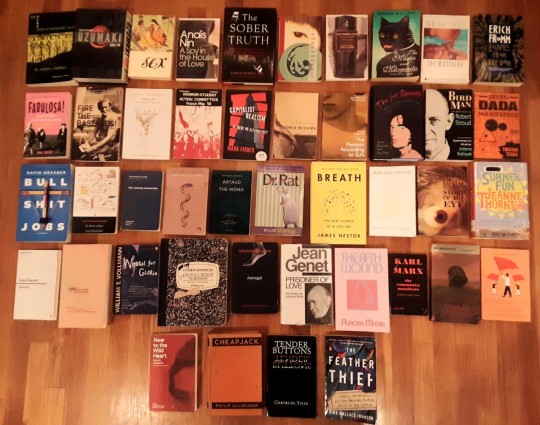
~Superlatives and Thoughts~
I read so many books this year I’m going to do a runner-up for each superlative category.
Favorite book: This is such a hard question this year. I think I gave out more five-star ratings on Goodreads this year than I ever have before. The books that got 5 stars from me this year were A Simple Story: The Last Malambo by Leila Guerriero, Capitalist Realism by Mark Fisher, The Emerald Mile by Kevin Fedarko, The Mustache by Emmanuel Carriere, The Passion According to GH by Clarice Lispector, trans girl suicide museum by Hannah Baer, The Fifth Wound by Aurora Mattia, Mammother by Zachary Schomburg, and Blackouts by Justin Torres. But I think my favorite book of the year was The Fifth Wound by Aurora Mattia. It is an embellished, fictionalized biography of the author’s life, chronicling a breakup that occurred just before she began her transition, and then a variety of emotional events afterward and her renewal of a connection with that person after a number of years had passed. The writing style is beautiful, extremely decadent, and sits in a sort of venn diagram of poetry, theory, fantasy and biography. My coworker who recommended this book to me said no one she’d recommended it to had finished it because they found it so weird. I read the first 14 pages very slowly because I didn’t exactly know what the book was doing, but I quickly fell completely in love with the imagery and the formatting style and the literary and religious references that have been worked into the book both as touchstones for biography and as vehicles for fantasy. There is a video I remember first seeing years ago, in which a beautiful pinkish corn snake slithers along a hoop that is part of a hanging mobile made of driftwood and macrame and white beads and prism crystals. This was the image that was in the back of my head the entire time I was reading The Fifth Wound, because it matched the decadence and the strangeness and the crystalline beauty of the language and visuals in the book. It is a pretty intense book, absolutely packed with images and emotion and ideas and preserved vignettes where reality and fantasy and theory overlap. It’s one of those books that’s hard to describe because it’s so full. It’s dense not in that the words or ideas are hard to understand, but in that it’s overflowing with imagery and feelings, and it feels like an overflowing treasure chest. Runner-up:The Mustache by Emmanuel Carriere. However, this book wins for a different superlative, so I’ve written more about it there.
Least favorite book: Querelle de Roberval by Kevin Lambert. I wrote a whole long review of it. In summary, Lambert’s book takes its name from Querelle de Brest, a novel by Jean Genet, and is apparently meant to be an homage to Genet’s work. Unfortunately, Lambert seems to misunderstand or ignore all the important aspects of Genet’s work that make it so compelling, and instead twists certain motifs Genet uses as symbols of love or transcendence into meaningless or negative connotations. He also attempts to use Genet’s mechanic of inserting the author into the narrative and allowing the author to have questionable or conflicting morals in order to emphasize certain aspects of the characters or narrative, except he does so too late in the game and ends up just completely undermining everything he writes. This book made me feel insulted on behalf of Jean Genet and all the philosophical thought he put into his work. Runner-up: What We See When We Read by Peter Mendelsund. This graphic designer claims that when people read they don’t actually imagine what characters look like and can’t conjure up an image in their head when asked something like “What does Jane Eyre look like to you?” Unfortunately, there’s nothing scientific in the book to back this up and it’s mostly “I” statements, so it’s more like “What Peter Mendelsund Sees (Or Doesn’t See) When He Reads”. It’s written in what seems to be an attempt to mimic Marshall McLuhan’s style in The Medium Is The Massage, but it isn’t done very well. I spent most of my time reading this book thinking This does not reflect my experience when I read novels so I think really it’s just a bad book written by someone who maybe has some level of aphantasia or maybe is a visual but not literary person, and who assumes everyone else experiences the same thing when they read. (Another runner-up would be The Hero With A Thousand Faces by Joseph Campbell, but I think that’s a given because it’s an awful piece of revisionist, racist trash, so I won’t write a whole thing about it. I can if someone wants me to.)
Most surprising/unexpected book: The Mustache by Emmanuel Carriere. This book absolutely wins for most surprising. However, I don’t want to say too much about it because the biggest surprise is the end. It was the most shocking, most unexpected and bizarre endings to a novel I’ve read in a long time, and I absolutely loved it. It was weird from the start and it just kept getting weirder. The unnamed narrator decides, as a joke, to shave off the moustache he’s had for his entire adult life. When his wife doesn’t react, he assumes that she’s escalating their already-established tradition of little pranks between each other. But then their mutual friends say nothing about the change, and neither do his coworkers, and he starts spiral into confusion and paranoia. I don’t want to spoil anything else because this book absolutely blew me away with its weirdness and its existential dread and anyone who likes weird books should read it. Runner-up: Morvern Callar by Alan Warner. I don’t even know what compelled me to open this book at work, but I’m glad I did. The book opens on Christmas, where the main character, Morvern, discovers her boyfriend dead by suicide on the kitchen floor of their flat. Instead of calling the police or her family, she takes a shower, gets her things and leaves for work. Her narrative style is strange, simultaneously very detached and extremely emotional, but emotional in an abstract way, in which descriptions and words come out stilted or strangely constructed. The book becomes a narrative of Morvern’s attempts to find solitude and happiness, from the wilderness of Scotland to late night raves and beaches in an unnamed Mediterranean city. The entire book is scaffolded by a built-in playlist. Morvern’s narrative is punctuated throughout by accounts of exactly what she’s listening to on her Walkman. The narrative style and the playlist and the bizarre behavior of the main character were not at all what I was expecting when I opened the book, but I read the entire book in about 3 hours and I was captivated the whole time. If you like the Trainspotting series of books, I would recommend this one for sure.
Most fun book: The Emerald Mile by Kevin Fedarko. This book was amazing. It was like reading an adventure novel and a thriller and a book on conservationism all wrapped into one and it was clearly very passionately written and it was a blast. I picked it up because I was pricing it at work and I read the captions on one of the photo inserts, which intrigued me, so I read the first page, and then I couldn’t stop. The two main narratives in the book are the history of the Grand Canyon (more specifically the damming of the Colorado River) and the story of a Grand Canyon river guide called Kenton Grua, who decided with two of his river guide friends to break the world record for fastest boat ride down the Colorado River through the Grand Canyon. The book is thoroughly researched, and reaches back to the first written record of the canyon, then charts the history of the canyon and the river up to 1983 when Grua made his attempt to race down the river, and then the aftermath and what has happened to everyone in the years since. All of the historical figures as well as the “current” figures of 1983 come to life, and are passionately portrayed. It’s a genuine adventure of a book, and I highly recommend it. Runner-up: Summer Fun by Jeanne Thornton. It asks “What if Brian Wilson of the Beach Boys was actually a trans woman?” Actually, that’s not quite it. It asks “What if a trans woman living in poverty in southwest America believed to an almost spiritual level that Brian Wilson was a trans woman?” The main character and narrator, Gala, is convinced that the lead singer of her favorite band, the Get Happies, (a fictional but fairly obvious parallel to the Beach Boys) is a trans woman. Half the book is her writing out her version of the singer’s life history, and the other half is her life working at a hostel in Truth Or Consequences, New Mexico, where she meets a woman who forces her out of her comfort zone and encourages her to face certain aspects of her self and identity and her connection with others. It’s a weird novel, and definitely not for everyone, but it’s fun. I was reading it on the train home and I was so into it that I missed my stop and had to get off at the next station and wait 20 minutes for the train going back the other way.
Book that taught me the most: Breath: The new science of a lost art by James Nestor. In it, Nestor explores why humans as a general population are so bad at breathing properly. He interviews scientists and alternative/traditional health experts, archaeologists, historians and religious scholars. He uses himself as a guinea pig to experiment with different breathing techniques from ancient meditation styles to essentially overdosing on oxygen in a lab-controlled environment to literally plugging his nose shut to only mouth-breathe for two weeks (and then vice-versa with nose breathing). It was interesting to see a bunch of different theories a laid out together regarding what kind of breathing is best, as well as various theories on the history of human physiology and why breathing is hard. Some of it is scientific, some pseudoscience, some just ancient meditation techniques, but he takes a crack at them all. What was kind of cool is that he tries every theory and experiment with equal enthusiasm and doesn’t really seem to favor any one method. Since he’s experimenting on himself, a lot of it is about the effects the experiments had on him specifically and his experiences with different types of breathing. His major emphasis/takeaway is that focusing on breathing and learning to change the ways in which we breathe will be beneficial in the long run (and that we should all breath through our noses more). While I don’t think changing how you breathe is a cure-all (some of the pseudoscience he looks at in this book claims so) I certainly agree that learning how to breath better is a positive goal. Runner-up: The Sober Truth by Lance Dodes. I say runner-up because a lot of the content of the book is things that I had sort of vague assumptions about based on my knowledge of addiction and AA and mental illness in general. But Dodes put into words and illustrated with numbers and anecdotes and case studies what I just kind of had a vague feeling about. It was cool to see AA so thoroughly debunked by an actual psychiatrist and in such a methodical way, since my skepticism about it has mostly been based on the experiences of people I know in real life, anecdotes I’ve read online, or musicians/writers/etc I’m a fan of that went through it and were negatively affected.
Most interesting/thought provoking book: Mammother by Zachary Schomburg. The biggest reason this book was so interesting is because the little world in which it exists is so strange and yet so utterly complete. In a town called Pie Time (where birds don’t exist and the main form of work is at the beer-and-cigarettes factory) a young boy called Mano who has been living his childhood as a girl decides that he is now a man and that it’s time for him to grow up. As this happens, the town is struck by an affliction called God’s Finger. People die seemingly out of nowhere, from a hole in their chest, and some object comes out of the hole. Mano collects the things that come out of these holes, and literally holds them in order to love them, but the more he collects, the bigger he becomes as he adds objects to his body. A capitalist business called XO shows up, trying to convince the people of Pie Time that they can protect themselves from God’s Finger with a number of enterprises, and starts to slowly take over the town. But Mano doesn’t believe death is something that should be run from. This book is so pretty, and the symbolism/metaphors, even when obvious, feel as though they belong organically in the world. A quote on the back of the book says it is “as nearly complete a world as can be”, and I think that’s a very accurate description. The story is interesting, the characters are compelling, and the magical realist world in which the story exists is fascinating. Runner up: trans girl suicide museum by Hannah Baer. This is a series of essays taken (for the most part) from Baer’s blog posts. They span a chunk of time in which she writes her thoughts and musings on her experience transition and transgender existence in general. It is mostly a series of pieces reflecting on “early” stages of transition. But I thought it was really cool to see an intellectual and somewhat philosophical take on transition, written by someone who has only been publicly out for a few years, and therefore is looking at certain experiences with a fresh gaze. As the title suggests, a lot of the book is a bit sad, but it’s not all doom and gloom. A lot of the emphasis is on the important of community when it comes to the experience of starting to transition and the first few years, and the importance of community on the trans experience in general. I really liked reading Hannah Baer’s thoughts as a queer intellectual who was writing about this stuff as she experienced it (or not too long after) rather than writing about the experience of early transition years and years down the line. It meant the writing was very sharp and the emotion was clear and not clouded by nostalgia.
Other thoughts/commentary on books I don’t have superlatives for:
I’m glad my first (full) book read in 2023 was A Simple Story: The Last Malambo by Leila Guierrero. It’s a small, compact gem of a book that follows the winner of an Argentinian dance competition. The Malambo is a traditional dance, and the competition is very fierce, and once someone wins, they can never compete again. The author follows the runner-up of the previous year, who has come to compete again. It paints a vivid picture of the history of the dance, the culture of the competition, and the character of the dancer the author has chosen to follow. It’s very narrowly focused, which makes it really compelling.
The Hearing Trumpet by Leonora Carrington could have easily won for most fun or most interesting book. Carrington was a surrealist writer and painter (and was in a relationship with Max Ernst until she was institutionalized and he was deported by the Nazis). In The Hearing Trumpet, an elderly woman called Marian is forced by her family to go live in an old ladies’ home. The first strange thing about the place is that all of the little cabins each woman lives in is shaped like some odd object, like an iron, or ice cream, or a rabbit. The other old women at the institution are a mixed bag, and the warden of the place is hostile. Marian starts to suspect that there are secrets, and even witchcraft involved, and she and a few of the other ladies start to try and unravel the occult mysteries hidden in the grounds of the home. The whole book is fun and strange, and the ending is an extremely entertaining display of feminist occult surrealism.
Sacred Sex: Erotica writings from the religions of the world by Robert Bates was a book I had to read for research for my debunking of Withdrawn Traces. It was really very interesting, but it was also hilarious to read because maybe 5% of any of the texts included were actually erotic. It should have been called “romantic writings from the religions of the world” because so little of the writing had anything to do with sex, even in a more metaphorical sense.
Every time I read Yukio Mishima I’m reminded how much I love his style. The Sailor Who Fell From Grace With The Sea almost usurped The Temple of the Golden Pavilion as my favorite Mishima novel. I’m fascinated with the way that Mishima uses his characters to explore the circumstance of having very intense feelings or reactions towards something and simultaneously wanting to experience that, while also wanting to have complete control and not feel them at all. There’s a scene in this novel where Noboru and his friends brutally kill and dissect a cat; it’s an intense and vividly rendered scene, made all the more intense by Noboru desperately conflicted between feeling affected by the killing and wanting to force himself to feel nothing. The amazing subtle theme running through the book is the difference between Noboru’s intense emotions and his desire/struggle to control them and subdue them versus Ryuji’s more subtle emotion that grows through the book despite his natural reserve. I love endings like the one in this book, where it “cuts to black” and you don’t actually see the final act, it’s simply implied.
In 2016 or 2017, I ran lights for a showcase for the drama department at UPS (I can’t remember now what it was) that included a bunch of scenes from various plays. I remember a segment from Hir by Taylor Mac, and a scene from The Aliens by Annie Baker. In the scene that I saw, one of the characters describes how when he was a boy, he couldn’t stop saying the word ladder, and the monologue culminates in a full paragraph that is just the word “ladder.” I can’t remember who was acting in the one that I saw at UPS, but that monologue blew me away, the way that one word repeated 127 conveyed so much. This year a collection of Annie Baker’s plays came in at work so I sat down and read the whole play and it was just incredible. I’d love to see the full play live, it’s absolutely captivating.
Narrow Rooms by James Purdy was a total diamond in the rough. It takes place in Appalachia, in perhaps the 1950s although it’s somewhat hard to tell. It follows the strange gay entanglement between four adult men in their 20s, who have known each other all their lives. It traces threads of bizarre codependency, and the lines crossed between love and hate. The main character, Sidney, has just returned home after serving a sentence for manslaughter. On his return, he finds that an old lover has been rendered disabled in an accident, and that an old school rival/object of obsession has been waiting for him. This rival, nicknamed “The Renderer” because of an old family occupation, has been watching Sidney all their lives. Both of them hate the other, but know that they’re destined to meet in some way. Caught in the middle of their strange relationship are Gareth, Sidney’s now-disabled former lover, and Brian, a young man who thinks he’s in love with The Renderer. The writing style took me some time to get used to, as it is written as though by someone who has taught themselves, or has only had basic classes on fiction writing. But the plot itself is so strange and the characters are so stilted in their own internality that it actually fits really well. Like The Mustache, this book had one of the strangest, most intensely visceral and shocking endings I’ve read in a while. It was also “one that got away.” I read it at work, then put it on my staff picks shelf, and only realized after someone else bought it that I should have kept it for myself.
The Passion According to G.H. by Clarice Lispector blew my mind. I really don’t want to spoil any of it, but I highly encourage anyone who hasn’t read it to do. The build in tension is perfect and last 30 pages are just incredible. Lispector’s style is so unique and so beautiful and tosses out huge existential questions like it’s nothing, and I love her work so much.
Moscow To The End Of The Line by Venedikt Erofeev was another really unexpected book. It’s extremely Russian (obviously) and really fun until suddenly it isn’t. The main character, a drunkard, gets on a train from Moscow to Petushki, the town at the end of the line (hence the title), in order to see his lover. On the way, he befriends the other people in his train car and they all steadily get drunker and drunker, until he falls asleep and misses his stop. Very Russian, somewhat strange, and I was surprised that it was written in the late 60s and not the 30s.
Dr. Rat by William Kotzwinkle was what I expected. Weird in a goofy way, a bit silly even when it’s serious, and rather heavy-handed satire. The titular Dr Rat is a rat who has spent his whole life in a laboratory and has gone insane. The other animals who are being tested on want to escape, but he’s convinced that all the testing is for the good of science and wants to thwart their rebellion. Unfortunately, all the other animals who are victims of human cruelty/callousness/invasion/deforestation/etc around the world are also planning to rebel, connection with each other through a sort of psychic television network. It’s a very heavy-handed environmentalist/anti-animal cruelty metaphor and general societal satire, but it’s silly and fun too.
Confessions Of A Part-Time Lady by Minette is a self-published, nearly impossible to find book that came into my work. It’s self-printed and bound, and was published in the 70s. It is the autobiographical narrative of a trans woman who did drag and burlesque and theatre work all across the midwest, as well as New York and San Francisco, from the 1930s up to the late 60s. It was originally a series of interviews by the two editors, who published it in narrative form, and it includes photos from Minette’s personal collection. It’s an amazing story, and a glimpse into a really unique time period of gender performance and queer life. She even mentions Sylvia Rivera, specifically when talking about gay activism. She talks about how the original group of the Gay Liberation Front was an eclectic mix of all sorts of people of all sexualities and genders and expressions. Then when the Gay Activists Alliance “took over”, they started pushing out people who were queer in a more transgressive or unusual way and there was more encouragement on being more heteronormative. She mentions Sylvia Rivera and Marsha P Johnson, saying “I remember Sylvia Rivera who founded STAR – Street Transvestite Action Revolutionaries. She was always trying to say things – the same kinds of things Marsha P Johnson says in a sweeter way – and they treated her like garbage. If that’s what ‘order’ is, haven’t we had enough?”
Whores For Gloria by William T Vollmann was exactly as amazing as I thought it would be. I love Vollmann’s style, because you can tell that even though the characters he’s writing about are characters, they’re absolutely based on people that he met or saw or spoke to in real life. The main character, Jimmy, is searching for his former lover, Gloria, who has either died or left him (it is unclear for most of the novel). He begins to use tokens bought from sex workers (hair, clothes, etc) to attempt to conjure her into reality, and when that doesn’t work, he pays them to tell him stories from their lives, and through their lives he tries to conjure Gloria. This novel’s ending had extremely similar vibes to the ending of Moscow To The End Of The Line.
Prisoner Of Love by Jean Genet was a lot to take in. It was weird reading it at this moment in time, and completely unplanned. It’s just that I have only a few more books to read before I’ve made my way through all Genet’s works that have been translated into English, and it was next on the list. Most of the book focuses on Genet’s time spent in Palestine in the 70s and his short return in the 80s. He also discusses the time he spent with the Black Panthers in the US, although it’s not the main subject of the book. Viewing Palestine from the point of view of Genet’s weird philosophical and moral worldview was really interesting, because what he chooses to spend time looking at or talking about is probably not what most would focus on, and because even his most political discussions are tinged with the uniquely Genet-style spirituality (if you can call it that? I don’t know what to call it) that is so much the exact opposite of objective. It’s definitely not a book about Palestine I would recommend reading without also having a grasp of Genet’s style of looking at the world and his various obsessions and preoccupations, because they really do inform a lot of his commentary. It was also written 15 years after his first trip to Palestine, partly from memory and partly from journal entries/notes, which gives it a sort of weirdly dreamlike quality much like his novels.
Blackouts by Justin Torres was so amazing! It blends real life and fiction together so well that I didn’t even realize that most of the people he references in the novel are real historical figures until he mentioned Ben Reitman, who I recognized as the Chicago King Of The Hobos and Emma Goldman’s lover. The book follows an unnamed narrator who has come to a hotel or apartment in the southwest in order to care for a dying elderly man called Juan Gay. Juan has a book called Sex Variants, a study of homosexuality from the 1940s which has been censored and blacked out. Back and forth, the narrator and Juan trade stories. The narrator tells his life story up until the present, including his first meeting with Juan in a mental hospital as a teenager. In turn, Juan tells the story of the Sex Variants book and its creator, Jan Gay (Ben Reitman’s real life daughter). The book explores the reliability of narrative, the power of collecting and documenting life stories, and of removing or changing things in order to create new or different narratives.
Again, Clarice Lispector rocking my world! Generally I can read a 200-ish page novel in somewhere between 2 and 4 hours depending on the content/writing style. Near To The Wild Heart took me 9 hours to read because I kept wanting to stop and reread entire paragraphs because they were so interesting or pretty or philosophical. The story focuses on Joana, whose strange way of looking at the world and going through life makes everyone sort of wary of her. This book is so layered I don’t really know how to describe it. So much of it is philosophical or existential musings through the vehicle of Joana. Unsurprisingly, it’s a beautiful book and I highly recommend it.
I’m just going to copy/paste my Goodreads review for Skye Papers by Jamika Ajalon: This book had so much potential that just…fell short. I could tell that it was written for an American audience but the way the reader/Skye is “taught” certain British terms and/or slang felt a bit patronizing. The characters were fleshed out and interesting and I liked them a lot but the plot crumbled quickly in the last half of the book Things sped up to a degree that felt strange and unnatural, the book’s pacing was inconsistent throughout. Perhaps that was deliberate considering the reveal at the climax, but if it was, it should have been utilized better. If the inconsistent pacing wasn’t deliberate, then it just made the book feel strange to read. There were moments were I felt like there should have been more fleshing out of certain character relationships. Even with the reveal at the end and the explanation of Pieces’ erratic/avoidant behavior, I wish there had been more fleshing out of the relationship or friendship between her and Skye at the beginning, when Skye first arrives in London. Characters who seemed cool/interesting got glossed over and instead there was a lot more dwelling on Skye walking around or busking or just hanging out. I could have gone without the last 30 or so pages after the big reveal, where Skye went back through everything that happened with the knowledge she (and the reader) had gained. It dragged on and on and at that point I felt like the whole story was so contrived that I just wasn’t interested anymore. A friend who read this book before I did said she thought it was an experimental novel that just hadn’t gone far enough, and I completely agree with her. I think if the style with the film script interludes went further, into printed visuals or more weirdness with the interludes, more experimental style with the main story, or something, it would have been really good. It just didn’t push hard enough.
The Feather Thief by Kirk Wallace Johnson was a fun little true crime novel about a young flautist who broke into a small English natural history museum in 2009 and stole hundreds of thousands of pounds worth of preserved rare bird skins dating back to the 19th century. He was a salmon fly-tying enthusiast and prodigy, and old Victorian fly designs used feathers of rare birds. The book first goes through the heist and the judicial proceedings, then examines the niche culture of Victorian fly-tying enthusiasts and obsessives, and then chronicles the author’s attempts to track down some of the missing birds. It was a quick, easy read, but fun and an unusual subject and I quite enjoyed it.
In 2024 I don’t plan on trying to surpass or even reach this year’s number. I’m going to start off the year reading The Recognitions by William Gaddis, then I’m going to re-read a number of books that I come across at work or in conversation and think Huh, I should reread that one of these days. So far, the books I am currently planning to reread: Sometimes A Great Notion by Ken Kesey, As I Lay Dying by William Faulkner, The People Of Paper by Salvador Plascencia, Mrs Dalloway by Virginia Woolf, The Mustache by Emmanuel Carriere, McGlue by Otessa Moshfegh, Long Day’s Journey Into Night by Eugene O’Neil, Acid Snow by Larry Mitchell, and Nightwood by Djuna Barnes.
#reading list#book list#book roundup#reading list year in review#books#squash rambles#reading year in review#book list roundup
6 notes
·
View notes